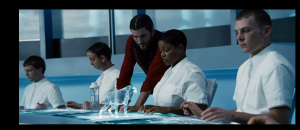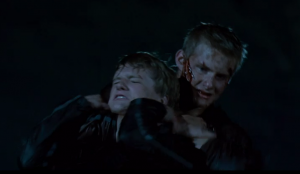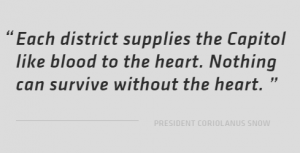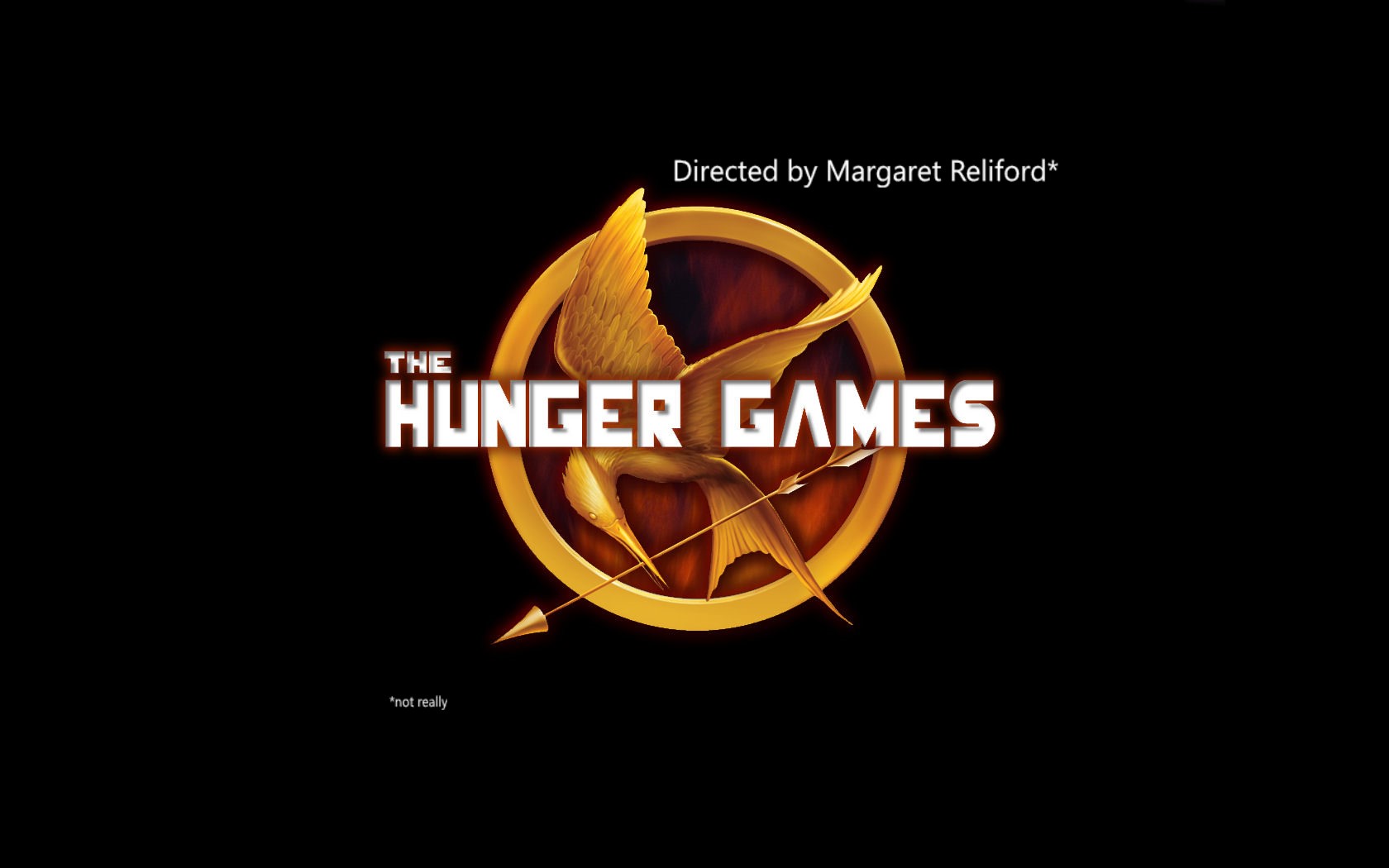The Hunger Games by Suzanne Collins: They’re on your Side
In The Hunger Games, Suzanne Collins focuses on the evil relationship between tributes; however, in my movie I focus on the evil relationship between the tributes and the Capitol. While some tributes might be more privileged than others, they are all at risk of being chosen for the Hunger Games. The career tributes‘ privilege can help protect them from the other tributes but not from the Capitol. While the readers and movie audience may partially understand the danger associated with the Capitol, the career tributes do not. Shifting the enemies, allows me to show that even the most privileged tributes’ powers are diminished by the greater evil and power of the Capitol.
In her book, Suzanne Collins pits the tributes against each other making it seem like they were the only real threat to each other. She shows this most prominently during the games with the alliance of the career tributes, but it can also be seen in the pre-game relationship between Katniss and Peeta. Katniss’ views of the games prevent her from seeing Peeta‘s sincerity. The readers could tell his actions were genuine, but Katniss thought he was trying to deceive her. When she finds herself falling for his seemingly sincere smile, she kisses him on the cheek to show him that “two can play at this game.” (page 72) In the Games, the alliance between the career tributes show a power imbalance that convinces the regular tributes that their only enemies were inside the arena with them. The allowance of gifts from sponsors and beneficial changes to the rules made it seem like the Capitol wanted everyone to have a chance at winning. The gifts and rule changes also prevent the tributes from seeing the Capitol as greater evil.

To foreshadow later events, I incorporate a scene where Peeta falls off of a rope ladder in the training center. The career tributes laugh at him, because they think he will be one of the easier tributes to dispose of. In response Peeta throws one of the weighted balls into a weapon stand, and the concerned looks that follow show that he is successful in proving his point. This scene shows that there are limits to the privilege the career tributes have even if they don’t fully recognize it yet.

The Game Makers are the middle men between the tributes and the Capitol. The Game Makers add things and obstacles that are equally dangerous to all of the tributes. The career tributes’ privilege was limited to the basic survival of nature and certain types of combat, so anything the Game Makers added caught them by surprise like everyone else. For example, the dog beasts at the end of the movie weren’t anything Cato was prepared to handle. The scenes where Game Makers made changes to the arena, show that the Capitol didn’t have favorites. They changed things to keep their audience engaged and got the tributes to kill faster. However, the Game Makers didn’t use their power to kill the tributes themselves because that would show the tributes that their privilege was only a Capitol tactic to keep them distracted. Giving privilege to a select few individuals, leads those individuals to believe they are favored.

In the very end, I chose to incorporate a piece where Cato realizes his fate saying ” Go on. I’m dead anyway. I always was, right ? I didn’t know that till now.” ( 2:05:12) Cato and the other career tributes thought their victories were secured because not only had they been training all of their life to be in the Hunger Games, but the winners of the previous Hunger Games were usually career tributes. The career tributes thought the Capitol was on their side; however, they later realized they are all the same to the Capitol.

The privilege that the Capitol gives out is merely a tactic they use to keep everyone in order. If everyone was equal, there would be more room for an uprising because people would want better. In other words, having a superior group distracts the governed body from wanting answers from the people who put them in their position ( the Capitol). Instead the people are led to boast their privilege or wish to gain it.
Works Cited:
Collins, Suzanne. The Hunger Games. NY, NY: Scholastic, 2008. Print.
Hunger Games. Dir. Francis Lawrence and Gary Ross. Lions Gate Entertainment Inc, 2012.movie.
Snow, President. “The Capitol.” The Capitol – The Official Government of Panem. N.p., n.d. Web. 28 Feb. 2017.

Hey Margaret,
I think the structure of this post is very well done. You continually show evidence, provide support, and in the end summarize your thesis very well. When I read it, it seemed like the post was progressing forward, rather than just standing still which made my job of reading it so easy.
One part I thought was missing was the “voice from outside” part of these posts. I think some outside commentary from an expert could help us see how your directorial beliefs differed from other commentators.
Your second to last sentence, and last full paragraph in general, really blew my mind. I always thought that the Capitol favored certain districts but your analysis showed otherwise. I would have never thought that the Capitol favoritism was a social construct, since I always thought it was clearly shown.
-Spencer
Margaret,
I think your comparisons between the book and the movie are well done. The structure of the post is good. Something I think you can improve on is identifying who you are impersonating. I was not quite sure who you were impersonating until the middle of the second paragraph. Something you can think about is why the capitol would give the tributes nice accommodations like a nice bed and large apartment. What do they achieve by doing that?
I think you bring very direct proof with the images and the text to focus us back into the idea that the Capitol is who we need to shift our blame too. I think this helps make your argument stronger. I also agree that a voice from an expert on the outside can help even further bring your argument full validity. I feel that this voice will help give more insight behind how others viewed your directorial decisions. Something to think about is why is the Capitol holds such a value to obtaining this control in the first place. Why would the Capitol want to be able to have a hold on the people to be able to control their highs and lows.
Hi Margaret,
This post brought up an intriguing question: what happens when the careers realize that they are merely pawns being pushed around by the Capitol? The next two books answer just that!
Your incorporation of pictures to compare the facial expressions of the smug careers and the doubting Peeta was excellent. Also, highlighting Cato’s face at the end along with his dismal quote truly helped push your argument forward.
One thing to work on is your formatting of the post. For example, at the very beginning of your post The Hunger Games should be either underlined or typed in italics. Additionally, it would help if you added a link to the page the pictures came from as a source since the movies could potentially be used as your “voice from the community.”
What would happen if you went a little deeper? Yes, the careers realize that they don’t matter as much for the first time – but what’s the significance and how did they come about that realization? Also, was this truly the first time they realized that they were merely pawns?
It seemed like you were playing around a lot with point of view, and in the novel we are limited to Katniss’s point of view. The movie also revolves around Katniss, which leaves less room to empathize with the other players. It might be worth exploring how the careers respond to death – especially to the death of a comrade. Why were they proud to be chosen to represent their district? Was Cato equally conflicted about his place in society at the end of the novel?
Pingback: elf sex games